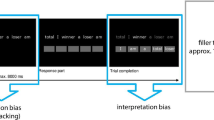Abstract
Prior research suggests that anorexic patients show a memory bias for fattening foods when they are processed in depth or with reference to the self. The present study examined whether anorexic subjects exhibit a bias for fattening foods when these are presented as task-irrelevant distractor stimuli. It also investigated whether anorexic patients pay less attention to emotion stimuli. A sequential word-word evaluation task was administered to 11 inpatients with anorexia nervosa and 11 non-dieting normal subjects. There were four types of distractor words: high caloric foods, positive, negative, and neutral. Anorexic patients recalled no more food words but fewer neutral and positive words than normal subjects. The present data suggest that, compared to healthy young women, anorexic patients show no memory bias for fattening foods when these data are presented as peripheral environmental information. Anorexic patients are perceptually no less sensitive to negative emotional information than normal subjects.
Similar content being viewed by others
References
Vitousek K.B., Hollon S.D.: The investigation of schematic content and processing in eating disorders. Cogn. Ther. Res., 14, 191–214, 1990.
Cooper M..J.: Cognitive theory in anorexia nervosa and bulimia nervosa: A review. Behav. Cogn. Psychother., 25, 113–145, 1997.
Faunce G.J.: Eating disorders and attentional bias: A review. Eat. Disord., 10, 125–139, 2002.
Channon S., Hemsley D., de Silva P.: Selective processing of food words in anorexia nervosa. Br. J. Clin. Psychol., 27, 259–260, 1988.
Cooper M.J., Todd G.: Selective processing of three types of stimuli in eating disorders. Br. J. Clin. Psychol., 36, 279–281, 1997.
Green M.W., McKenna F.P., de Silva M.S.L.: Habituation patterns to colour naming of eating-related stimuli in anorexics and non-clinical controls. Br. J. Clin. Psychol., 33, 499–508, 1994.
Mendlewicz L., Nef F., Simon Y.: Selective handling of information in patients suffering from restrictive anorexia in an emotional stroop test and a word recognition test. Neuropsychobiology, 44, 59–64, 2001.
Hermans D., Pieters G., Eelen P.: Implicit and explicit memory for shape, body weight, and food related words in patients with anorexia nervosa and non-dieting controls. J. Abnorm. Psychol., 107, 193–202, 1998.
Pietrowsky R., Krug R., Fehm H.L., Born J.: Food deprivation fails to affect preoccupation with thoughts of food in anorectic patients. Br. J. Clin. Psychol., 41, 321–326, 2002.
Bruch H.: Eating disorders. New York, Basis Books, 1973.
Taylor G.J., Bagby R.M., Parker J.D.: The alexithymia construct: a potential paradigm for psychosomatic medicine. Psychosomatics, 32, 153–164, 1991.
Bourke M.P., Taylor G.J., Parker J.D., Bagby R.M.: Alexithymia in women with anorexia nervosa. A preliminary investigation. Br. J. Psychiatry, 161, 240–243, 1992.
Schmidt U., Jiwany A., Treasure J.: A controlled study of alexithymia in eating disorders. Compr. Psychiatry, 34, 54–58, 1993.
Sexton M.C., Sunday S.R., Hurt S., Halmi K.A.: The relationship between alexithymia, depression, and axis II pathology in eating disorder inpatients. Int. J. Eat. Disord., 23, 277–286, 1998.
Lane R.D., Sechrest L., Riedel R., Shapiro D.E., Kaszniak A.W.: Pervasive emotion recognition deficit common to alexithymia and the repressive coping style. Psychosom. Med., 62, 492–501, 2000.
Rapaport D.: Emotions and memory. New York, International Universities Press, 1942.
Reber R., Perrig W.J., Flammer A., Walther D.: Levels of processing and memory for emotional words. Swiss J. Psychol., 53, 78–85, 1994.
Wittchen H.U., Wunderlich U., Gruschwitz S., Zaudig M.: SKID-I. Strukturiertes Klinisches Interview für DSM-IV. Göttingen, Hogrefe, 1997.
Garner D.M., Olmstead M.P., Polivy J.: Development and validation of a multidimensional eating disorder inventory for anorexia nervosa and bulimia. Int. J. Eat. Disord., 2, 15–34, 1983.
Thiel A., Paul T.: Entwicklung einer deutschsprachigen Version des Eating-Disorder-Inventory. Z. Diff. Diagn. Psychol., 9, 267–278, 1988.
Watson D., Clark L.A., Tellegen A.: Development and validation of brief measures of positive and negative affect: The PANAS scales. J. Pers. Soc. Psychol., 54, 1063–1070, 1988.
Krohne H.W., Egloff B., Kohlmann C.W., Tausch A.: Untersuchungen mit einer deutschen Version der “Positive and Negative Affect Schedule” (PANAS). Diagnostica, 42, 139–156, 1996.
Wechsler D.: Wechsler Adult Intelligence Scale — Revised (WAIS-R). New York, Psychological Cooperation, 1981.
Tewes U.: Hamburg-Wechsler-Intelligenztest für Erwachsene — Revision 1991 (HAWIE-R). Göttingen, Hogrefe, 1991.
Hager W., Mecklenbräuker S., Möller H., Westermann R.: Emotionsgehalt, Bildhaftigkeit, Konkretheit und Bedeutungsgehalt von 580 Adjektiven: Ein Beitrag zur Normierung und zur Prüfung einiger Zusammenhangshypothesen. Archiv. Psychol., 137, 75–97, 1985.
Schwibbe M., Räder K., Schwibbe G., Borchardt M., Geiken-Pophanken G.: Zum emotionalen Gehalt von Substantiven, Adjektiven und Verben. In: Hager W., Hasselhorn M. (Eds.), Handbuch deutscher Sprachnormen. Göttingen, Hogrefe, 1994, pp. 272–284.
Celex: The Celex Lexical Database, Release 2. Nijmegen, Centre for Lexical Information, 1995.
Sackville T., Schotte D.E., Touyz S.W., Griffiths R., Beumont P.J.V.: Conscious and preconscious processing of food, body weight and shape, and emotionrelated words in women with anorexia nervosa. Int. J. Eat. Disord., 23, 77–82, 1998.
Williamson D.A., Muller S.L., Reas D.L., Thaw J.M.: Cognitive bias in eating disorders: Implications for theory and treatment. Behav. Modif., 23, 556–577, 1996.
Williams J.M.G., Mathews A., MacLeod C.: The emotional Stroop task and psychopathology. Psychol. Bull., 120, 3–24, 1996.
Murphy R., Nutzinger D.O., Paul T., Leplow B.: Dissociated conditional-associative learning in anorexia nervosa. J. Clin. Exp. Neuropsychol., 24, 176–186, 2002.
Gray J.A., McNaughton N.: The neuropsychology of anxiety: Reprise. Nebraska Symposium on Motivation, 43, 61–134, 1996.
Delvenne V., Goldman S., deMaertalaer V., Lotstra F.: Brain glucose metabolism in eating disorders assessed by positron emission tomography. Int. J. Eat. Disord., 25, 29–37, 1999.
Nozoe S., Naruo T., Nakabeppu Y., Soejima Y., Najako M., Tanaka H.: Changes in regional cerebral blood flow in patients with anorexia nervosa detected through single photon emission tomography imaging. Biol. Psychiatry, 34, 578–580, 1993.
Author information
Authors and Affiliations
Corresponding author
Rights and permissions
About this article
Cite this article
Suslow, T., Ohrmann, P., Lalee-Mentzel, J. et al. Incidental learning of food and emotional words in women with anorexia nervosa. Eat Weight Disord 9, 290–295 (2004). https://doi.org/10.1007/BF03325084
Published:
Issue Date:
DOI: https://doi.org/10.1007/BF03325084



